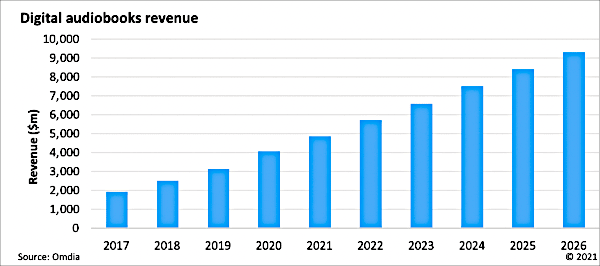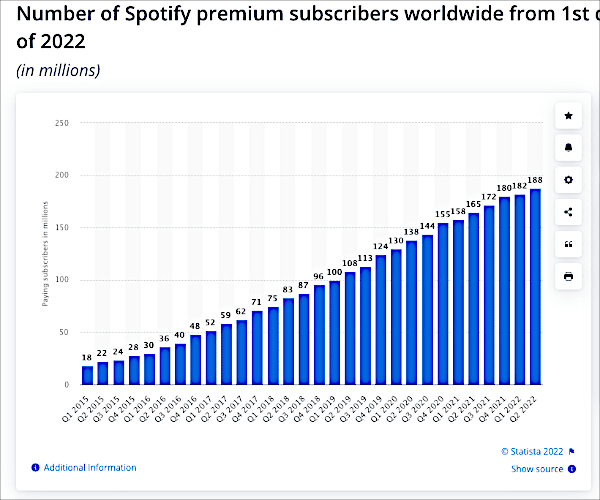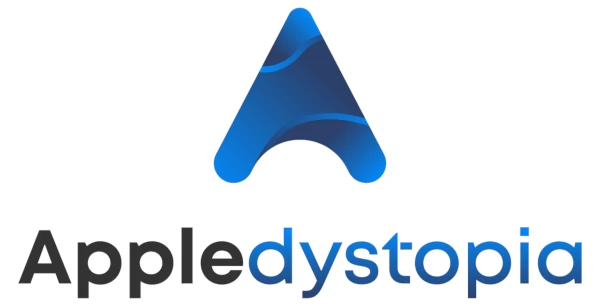Apple Blocks Spotify’s Attempts to Direct Audiobooks Sales Outside of the App Store
![]()
November 2, 2022 at 3:06 p.m.
Audiobooks are a popular way to catch up on reading without all of the eye strain. If you’re stuck in a car for a few hours a day, having books read aloud makes the journey more fulfilling. I enjoy listening to audiobooks while driving, doing chores, or falling asleep.
The audiobook market is exploding. In 2017, global revenue from audiobooks totaled just under $2 billion. These digital assets will now bring in almost $6 billion in 2022. With the expanding market, more competitors are joining the fray.

Spotify recently launched its audiobook effort in September 2022; however, competing against Apple and Audible will take a lot of work. Given the company’s rocky foundations, with year-over-year net losses and a plummeting stock, the move could stress the company more than shore up its financial stability.
Audible offers over 300,000 titles; however, selling them has proven difficult, as the company tries to evade Apple’s 30% fee on App Store sales. The Spotify iOS app displays a narrated book title with a lock icon. Spotify subscribers must purchase the title through an email link before it appears in the iOS app.
Selling books through email links is a dubious prospect for consumers. Malicious actors can hijack this process by fooling users into believing there are problems with their accounts. It’s always best to complete these transactions within the app, but for Spotify to evade Apple’s 30% fee, they subject the user to a substandard experience.
Another problem with this approach is that it needs clarification for the end user. Apple won’t allow Spotify to direct purchases outside of the App Store. Any attempt to add in-app verbiage leading users to the Spotify audiobook store has faced rejection by Apple’s App Store. This isn’t a new battle. Epic Games and Meta have also fought Apple and lost.
The Epic Games v. Apple decision sets up a legal precedent in favor of Apple. The court ruled that Apple is not a monopoly due to the Google Play Store’s existence. The judge ruled against Apple on one of ten counts, finding that the company cannot block developers from linking to other storefronts.
For Spotify, the ruling does give them some wiggle room; however, Apple gets to determine how much the streaming company can squirm. For now, it appears Apple will only allow the bare minimum. Apple has blocked every attempt for Spotify to communicate off-app audiobook sales. They did this to the Facebook app and Fortnite, and neither company could mount an effective legal challenge. Ultimately, Apple owns the App Store, and developers must abide by the rules.
Audible effectively skirts App Store taxes by selling audiobooks through a credit system. Premium subscribers earn one credit a month. All members can buy credits a la carte. But the app doesn’t promote these sales. Since Amazon owns Audible, it can successfully sell subscriptions outside the App Store. Amazon has a much bigger and better store than Apple. Audible is, by far, the largest audiobook provider, accounting for 61% of the market, based on consumer interest.

Spotify doesn’t have the legal resources to fight this. The company currently struggles with slowing growth, net losses, and a sagging stock. With a looming recession, its options are limited. Spotify can either play by Apple’s rules or provide its products and services over the web.
One of the reasons why Spotify and other apps are so successful is because they exist in Apple’s marketplace. Over a billion people have access to the App Store. The streaming media giant could release and market all of its products on the web. They won’t do this because existing on the App Store is central to Spotify’s sustenance and growth.
Finding current numbers on how many iOS users subscribe to Spotify is difficult. According to Statista, 16% of all iOS users subscribed to Spotify Premium in 2017. That’s 16% of about a billion people — 160 million paying iOS customers. But these numbers don’t fit with overall sales of 71 million subscriptions by the end of 2017. Suffice it to say that most of Spotify’s paid customer base derives from iOS.


While it’s true that Apple’s 30% tax is excessive and doesn’t come close to justifying costs, that’s not unique to commerce. If you go out for fine dining, the food and service may cost a fraction of the bill. Are you going to haggle over the price of dinner at an upscale restaurant?
Last year, Google Play reduced its fee to only 15% of the first $1 million, down from 30%. When a developer earns over $1 million, they charge a 30% fee, which is the industry standard. But Google Play isn’t the fine dining experience of the App Store. Most of Spotify’s customers come from the App Store. They use iOS on an iPhone. Apple built a superior App Store, and Spotify, Meta, Epic Games, and every other developer rely on it.
From Apple’s point of view, they’re a premier digital marketplace with consumers willing to purchase digital items. Beyond data center and development costs, Apple built a digital space where people want to download apps and initiate in-app purchases. Apple did a lot of the difficult work of defining how contemporary digital commerce should work. Countless digital marketplaces have ripped off these designs, but none are as successful as the App Store.
Spotify won’t win this battle. If they’re foolish enough to take it to court, there are already legal precedents supporting Apple’s business practices. Spotify may choose to mimic Audible, but they don’t have the presence of Amazon to sell audiobooks.



